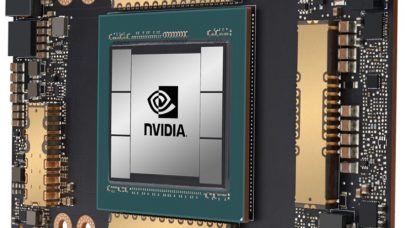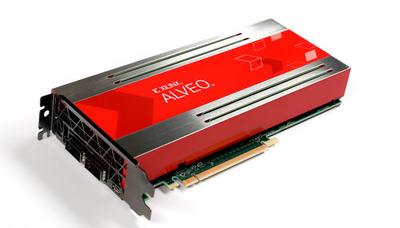
The Latest MLPerf Inference Results: Nvidia GPUs Hold Sway but Here Come CPUs and Intel
September 22, 2021
The latest round of MLPerf inference benchmark (v 1.1) results was released today and Nvidia again dominated, sweeping the top spots in the closed (apples-to-ap Read more…

Inspur Takes OCP Beyond Hyperscalers
May 12, 2020
Inspur, China’s server leader, is expanding its AI offerings based on Open Compute Project specifications, including an OCP “cloud optimized” server geare Read more…

AI Is Boosting Server Sales in China
February 6, 2020
Emerging AI workloads are propelling the booming Chinese server market, particularly those hosting programmable co-processors capable of supporting graphics chips used for parallel processing of machine learning tasks. The chief benefactor has been China’s server leader, Inspur. According to datacenter... Read more…

Xilinx Moves FPGAs Deeper into Datacenters
October 17, 2018
Three Chinese infrastructure vendors are embracing FPGA technology as a way of accelerating datacenter workloads. FPGA specialist Xilinx Inc. announced during a developer forum in Beijing this week that Alibaba Cloud, Huawei and server vendor Inspur are rolling out datacenter platforms based on the chip maker’s FPGA-as-a-service model. Among the datacenter workloads being targeted is AI inference, the partners said Tuesday. Read more…

ASC17 Makes Splash at Wuxi Supercomputing Center
April 24, 2017
A record-breaking twenty student teams plus scores of company representatives, media professionals, staff and student volunteers transformed a formerly empty hall inside the Wuxi Supercomputing Center into a bustling hub of HPC activity, kicking off day one of 2017 Asia Student Supercomputer Challenge (ASC17). Read more…

Spurred by Global Ambitions, Inspur in Joint HPC Deal with DDN
January 17, 2017
Inspur, the fast-growth cloud computing and server vendor from China that has several systems on the current Top500 list, and DDN, a leader in high-end storage, Read more…

Huazhong University of Science and Technology Crowned the ASC16 Champion
April 22, 2016
ASC Student Supercomputer Challenge 2016 (ASC16) concluded in Wuhan on April 22. The co-host Huazhong University of Science and Technology won the championship Read more…

HPL Record of 12.03TFLOPS Created at ASC16
April 20, 2016
In the first day of HPL contest at the ASC Student Supercomputer Challenge (ASC16) on April 20, the team from Zhejiang University achieved a floating point comp Read more…

- Click Here for More Headlines

Whitepaper
Transforming Industrial and Automotive Manufacturing
In this era, expansion in digital infrastructure capacity is inevitable. Parallel to this, climate change consciousness is also rising, making sustainability a mandatory part of the organization’s functioning. As computing workloads such as AI and HPC continue to surge, so does the energy consumption, posing environmental woes. IT departments within organizations have a crucial role in combating this challenge. They can significantly drive sustainable practices by influencing newer technologies and process adoption that aid in mitigating the effects of climate change.
While buying more sustainable IT solutions is an option, partnering with IT solutions providers, such and Lenovo and Intel, who are committed to sustainability and aiding customers in executing sustainability strategies is likely to be more impactful.
Learn how Lenovo and Intel, through their partnership, are strongly positioned to address this need with their innovations driving energy efficiency and environmental stewardship.
Download Now
Sponsored by Lenovo
Whitepaper
How Direct Liquid Cooling Improves Data Center Energy Efficiency
Data centers are experiencing increasing power consumption, space constraints and cooling demands due to the unprecedented computing power required by today’s chips and servers. HVAC cooling systems consume approximately 40% of a data center’s electricity. These systems traditionally use air conditioning, air handling and fans to cool the data center facility and IT equipment, ultimately resulting in high energy consumption and high carbon emissions. Data centers are moving to direct liquid cooled (DLC) systems to improve cooling efficiency thus lowering their PUE, operating expenses (OPEX) and carbon footprint.
This paper describes how CoolIT Systems (CoolIT) meets the need for improved energy efficiency in data centers and includes case studies that show how CoolIT’s DLC solutions improve energy efficiency, increase rack density, lower OPEX, and enable sustainability programs. CoolIT is the global market and innovation leader in scalable DLC solutions for the world’s most demanding computing environments. CoolIT’s end-to-end solutions meet the rising demand in cooling and the rising demand for energy efficiency.
Download Now
Sponsored by CoolIT
Advanced Scale Career Development & Workforce Enhancement Center
Featured Advanced Scale Jobs:
HPCwire Resource Library
HPCwire Product Showcase
© 2024 HPCwire. All Rights Reserved. A Tabor Communications Publication
HPCwire is a registered trademark of Tabor Communications, Inc. Use of this site is governed by our Terms of Use and Privacy Policy.
Reproduction in whole or in part in any form or medium without express written permission of Tabor Communications, Inc. is prohibited.
























